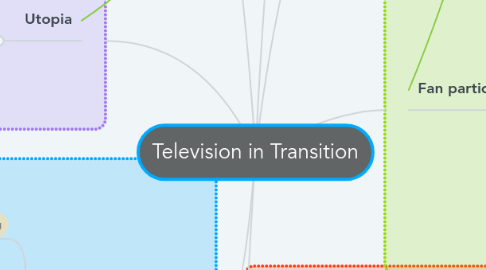
1. Utopia
1.1. Henry Jenkins
1.1.1. positions himself as a critical utopian, sees hopes for the future but also says we need to remain skeptical and acknowledge the barriers in place
1.2. Mark Crispin Miller, Noam Chomsky, Robert McChesney
1.2.1. skeptical, focus more on the barriers and do not focus on hope
1.3. Lévy
1.3.1. sees his idea of a collective intelligence as an achievable utopia, meaning it is not far off and definitely within reach
2. Is TV dead?
2.1. Class Debate
2.1.1. Michael Z. Newman
2.1.1.1. streaming on demand is for those who can afford it, thus reaffirming the difference between class and taste.
2.1.2. Elana Levine
2.1.2.1. high art and low art are not set in stone nor are they permanent but rather get re-evaluated when new circumstances arrive
2.1.2.2. Pierre Bourdieu
2.1.2.2.1. taste is a system inscribed in people’s mind, reproducing identities by knowing what you like to watch: you are what are you like. Taste classifies.
2.2. State of Television
2.2.1. John Ellis
2.2.1.1. says tv is merely entering a new phase
3. Copyright debate
3.1. Laurence Lessig
3.1.1. says current copyright law is too much
3.1.2. citing Disney an example to illustrate how the image of the mouse did not used to be copyrighted
3.2. James Boyle
3.2.1. wants to find more a common middle ground, one where work can be protected by law but does not restrict creativity and inspiration.
3.3. Jack Valenti
3.3.1. takes a hard stance against current copyright laws, deeming them as “terrorist”
3.3.2. says he finds them to be incredibly limiting in regard to inspiration and creativity.
4. Passive/Inactive audiences
4.1. Henry Jenkins
4.1.1. argues that the convergence culture encourages participation
4.1.2. says it also promotes collective intelligence thus leading to a sense of community
4.2. George Gilder
4.2.1. argued that invention of computer pushed toward ever more decentralisation and personalisation.
5. Television and citizenship
5.1. Liesbeth van Zoonen
5.1.1. says that participatory shows encourage a passive audience
5.1.2. audiences are able to form their own thoughts on it and become more politically involved
5.2. Cernetig
5.2.1. says that it’s not a good thing for fans to be political engaged in shows
5.2.2. argues that it’s not something to be taken seriously
5.3. Melissa Brough and Sangita Shresthova
5.3.1. take a quite neutral stance, say that the audiences in these are neither fully passive nor inactive
5.3.2. but are rather a combination, but do say that this participation is still politically relevant.
6. Localisation
6.1. Jolien van Keulen and Tonny Krijnen
6.1.1. wonder if localisation is ever really achieved when shows get produced with the same blueprint
6.2. Dowd TJ
6.2.1. says true localisation is a complicated matter
6.2.2. and is critical of the debate surrounding it as does not recognise the creativity behind the scenes.
7. Fan participation
7.1. Henry Jenkins
7.1.1. takes a culturalist approach in this debate, saying that the agency of modern audiences allows for creative ways of self-expression, giving a chance for audiences to participate in the story world
7.2. Mark Andrejevic
7.2.1. positions himself on both side of the argument, seeing the value of fan participation and creation, but also is wary of the free labor these fans deliver by doing so.
7.3. Jonathan Hardy
7.3.1. does not take up a very strong side in this debate but does touch upon how fan generated content can be used a marketing tool by corporations
7.4. Francesca Coppa
7.4.1. takes up a strong positive position towards fan participation, specifically the ‘vidding’ which allows mostly female fans to take agency in a world that is mostly provided for men
